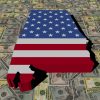The Fraser Institute released the 2021 Economic Freedom of North America rankings this week, and there’s good and bad news for Alabama.
The good news is that our state has improved in the rankings since last year, moving from a score of 5.79 to 6.39 out of 10. The bad news is that we are 29th among the 50 states.
You might ask, “What is economic freedom anyway?” According to the report’s authors — Dean Stansel, José Torra, and Fred McMahon — economic freedom involves “minimal government interference, relying upon personal choice and markets to answer basic economic questions such as what is to be produced, how it is to be produced, how much is produced, and for whom production is intended.”
The 6.39 figure emerged out of a complex calculation weighing various factors, including government spending(general consumption expenditures by government as a percentage of income, transfers and subsidies as a percentage of income, and insurance and retirement payments as a percentage of income), taxes (income and payroll revenue as a percentage of income, top marginal income tax rate and the income threshold at which it applies, property tax and other taxes as a percentage of income, and sales taxes as a percentage of income), and labor market regulations (full-time minimum wage income as a percentage of per capita income, government employment as a percentage of total state employment, and union density).
A score of 7.83 distinguishes New Hampshire as the freest state, followed by Tennessee, Florida, Texas, Virginia, Georgia, South Dakota, Idaho, North Dakota, and North Carolina. New York ranked at the bottom with a score of 4.33. That, and government lockdowns, might explain why so many people are fleeing the Big Apple.
These figures are based on pre-pandemic data. It’s unclear how future iterations of this report will account for pandemic-related emergency responses and lockdowns.
Alabama’s political leaders pay lip-service to free markets and economic prosperity. Why haven’t their words translated into concrete, measurable outcomes that would improve our standing in the rankings? Part of the reason is that Alabama has a large public sector and a small private sector. Government doesn’t add or create value; it simply moves money around from one place to another, taxing and spending but never creating. Entrepreneurs, on the other hand, generate value and opportunity, taking risks that government cannot take and innovating in ways that bureaucracies cannot.
Another reason is a fundamental misunderstanding about the relationship between government and business. Saying you’re “pro-business” doesn’t prove your commitment to economic freedom. Many businesses dislike economic freedom, which requires unfettered competition. Businesses often pursue anticompetitive policies and practices, lobbying government for official privileges and advantages to gain a leg up on the competition. Consumers, of course, are the victims of this cronyism, which causes prices to rise.
Crony capitalism gives “capitalism” a bad name. Unfortunately, we have too much of it in Alabama.
The Manuel H. Johnson Center for Political Economy at Troy University is a member of the EFNA network and remains dedicated to advancing economic freedom in our state and our region. By different measures, Alabama continues to register as one of the poorest states in the country. Researchers at the Johnson Center believe that we Alabamians can do better, that our state can become an engine of economic progress and prosperity, a shining example to our neighbors and a testament to the reality that low taxes, deregulation, and competition yield widespread flourishing and happiness.
As population shifts from the Midwest and the Northeast to the South—to the warmer climates, friendlier cultures, and lower taxes found in, say, Texas or Florida—Alabama must embrace economic freedom both to keep up and to set ourselves apart. We have a bright future, and I predict that by the time my children are grown, we will be leading rather than lagging in the economic freedom indices.
But only if we decide to be free.


















































